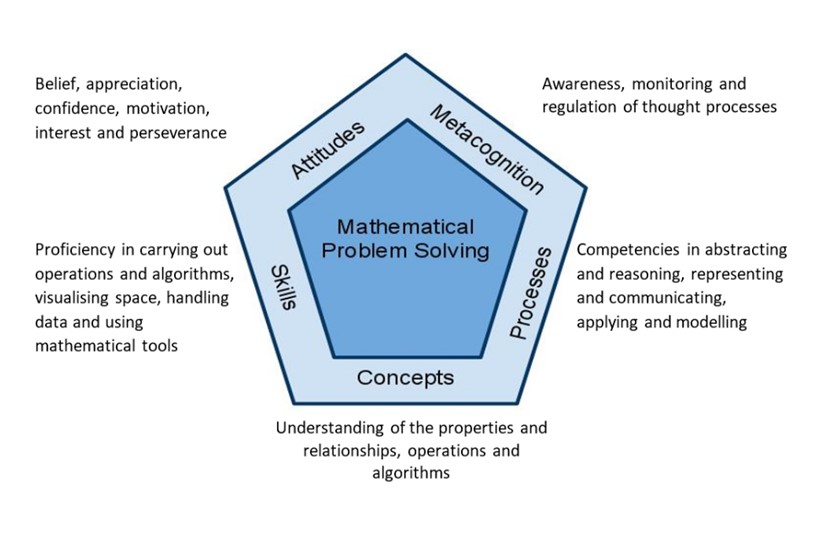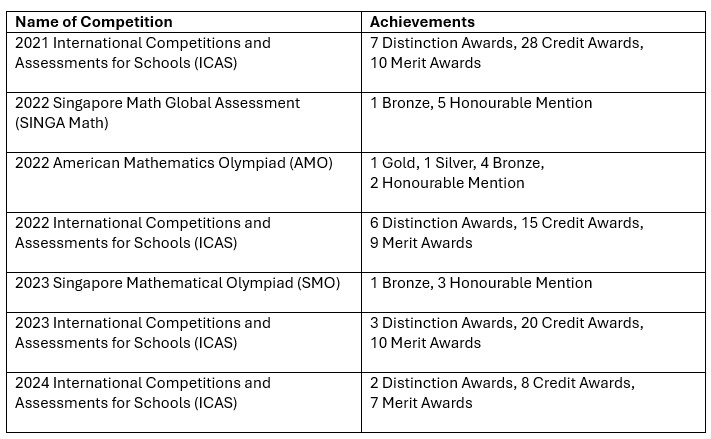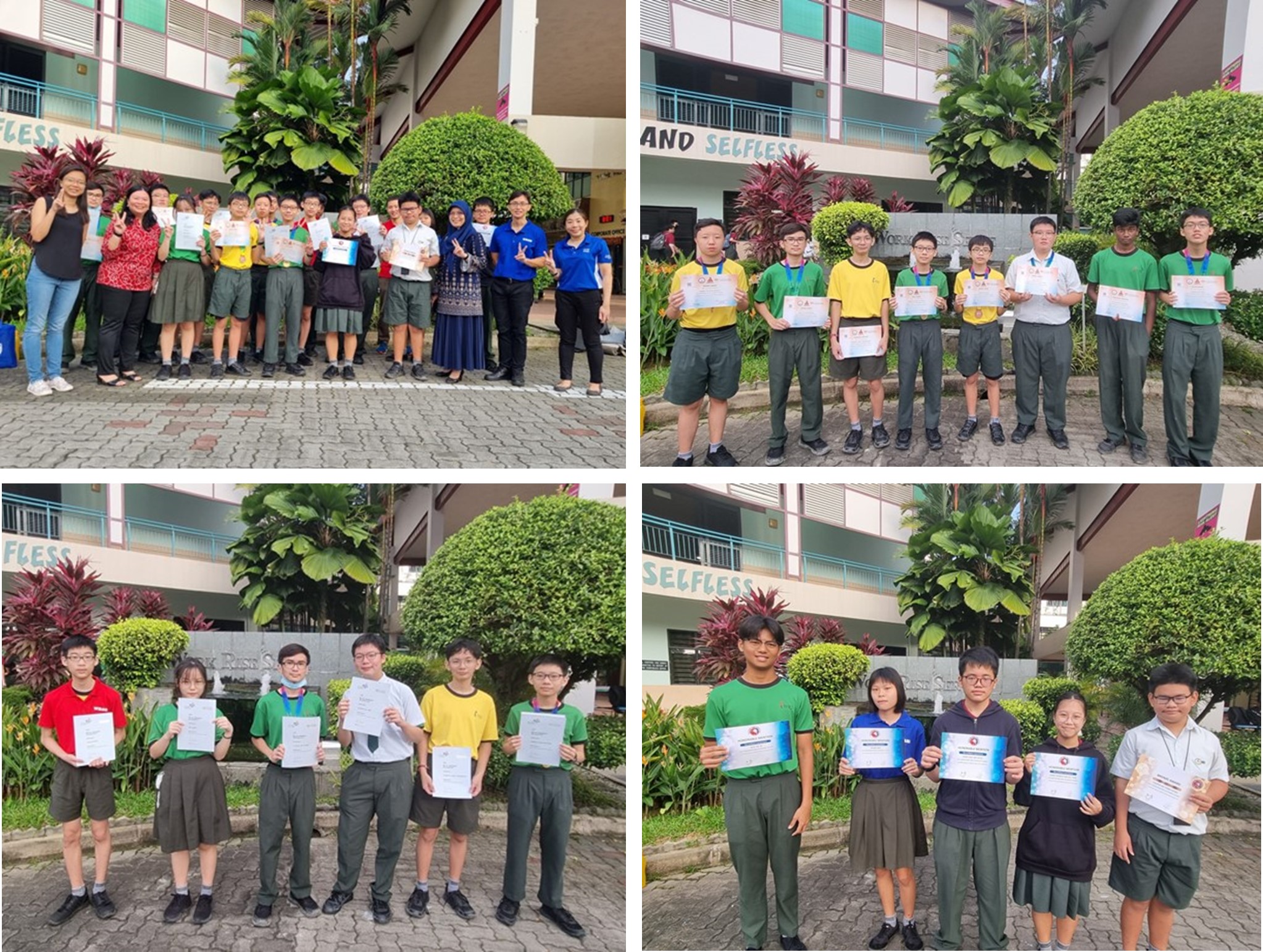Mathematics
Mathematics
Department Programmes / Highlights
WRSS Mathematics Curriculum
The Mathematics Department in WRSS adopts a two-prong approach to deliver our curriculum to cater to the learning needs of our students, primarily to strengthen the foundation for the masses, and to enhance the competency in numeracy for those with a keen interest to pursue Science, Technology, Engineering and Mathematics (STEM) education and career.
The overarching goal of the national Mathematics curriculum is to ensure that all students will achieve a level of mastery of Mathematics to serve them well in life, and for those who have the interest and ability, to learn mathematics at the highest possible level.
In Woodlands Ring Secondary School (WRSS), in order to prepare our students for the respective GCE O/N(A)/N(T)-Level Examinations, the school-based Mathematics curriculum is structured to enable our students to:
- acquire mathematical concepts and skills for continuous learning in Mathematics and to support learning in other subjects;
- develop thinking, reasoning, communication, application and metacognitive skills through a mathematical approach to problem-solving;
- connect ideas within Mathematics and between Mathematics and other subjects through applications of Mathematics; and
- inculcate positive attitudes, build confidence and foster interest in Mathematics so as to enable all to appreciate its value in making informed decisions in real life.
The school-based Mathematics curriculum of WRSS is based on the national Mathematics Framework as seen in Diagram 1, developed by the Mathematics Unit of Curriculum Planning and Development Division (CPDD), Ministry of Education (MOE), Singapore. The central focus of this framework is mathematical problem-solving, i.e. using Mathematics to solve problems. This framework sets the direction for and provides guidance in the teaching, learning, and assessment of Mathematics at all levels, from primary to pre-university; and also reflects the 21st Century Competencies.

This framework emphasises conceptual understanding, skills proficiency and mathematical processes; whilst focussing on attitudes and metacognition as well, because these five components are inter-related to one another.
The GCE O/N(A)/N(T)-Level Mathematics syllabi are organised along three content strands while the development of processes, metacognition and attitudes are embedded in the learning experiences that are associated with the content as seen in Diagram 2.
 Diagram 2: Overview of GCE O/N(A)/N(T)-Level Mathematics Syllabi
Diagram 2: Overview of GCE O/N(A)/N(T)-Level Mathematics Syllabi
In brief, the respective content strands are as described below:
- ‘Number & Algebra’ is the basic building block of school Mathematics. A good understanding of numbers in terms of their meanings, properties and operations provides the foundation for the learning of Mathematics. Basic algebra concepts and skills, and algebraic thinking are essential for problem-solving and these should be developed progressively.
- ‘Geometry’ is the study of points, lines, angles, figures and their properties and relationships. The study of geometry develops spatial visualisation and reasoning skills, which are critical in solving geometrical problems in the real world.
- ‘Measurement’ involves finding physical quantities such as length, mass, area, volume and time. Units such as centimetres, kilogrammes, square metres, cubic metres and seconds are attached to numbers in order to make sense of the quantities. Both ‘Geometry’ and ‘Measurement’ deal with shapes and figures that serve as models of real objects.
- ‘Statistics’ provides the methods and tools to summarise, represent, analyse and interpret data such that useful information can be derived for decision-making and in understanding a situation.
- ‘Probability’ provides the means to understand chance, randomness and uncertainty that can be seen in the everyday life. A good understanding of statistics and probability will enhance a person’s understanding of the world of data and information around them.
Throughout the four/five years of Mathematics education in WRSS, our students will be provided with learning experiences and opportunities for them to:
- apply concepts and skills learnt to solve problems in real-world context (Processes);
- communicate their reasoning and connections through various mathematical tasks and activities (Processes);
- develop metacognitive awareness and strategies through reflective discourse (Metacognition); and
- appreciate the usefulness of Mathematics in solving problems in real-world context and foster interest in the subject (Attitudes).
By the end of the fourth/fifth year in offering Mathematics, our students will take the GCE O/N(A)/N(T)-Level Examinations. The assessment objectives (AOs) of GCE O/N(A)/N(T)-Level Mathematics serve to test students’ abilities to:
- use and apply standard techniques (AO1);
- solve problems in a variety of contexts (AO2); and
- reason and communicate mathematically (AO3).
Mathematics Department Highlights
The Mathematics Department seeks to develop our students into analytical and logical thinkers with problem solving skills for application in the real-world context. The department has endeavoured to enhance the quality of students’ learning through our curriculum within and beyond the classroom as we believe that inherent in every child, there is a potential to be developed, when given the right stimulus, nurturing, and platforms for exposure. From 2021 onwards, a tiered approach was adopted to actively stretch and prepare our students through a variety of competitions, both at the national and international levels.
The table below summarises our students’ achievements over the years.



